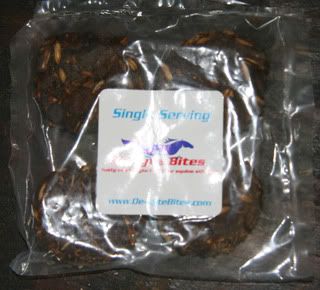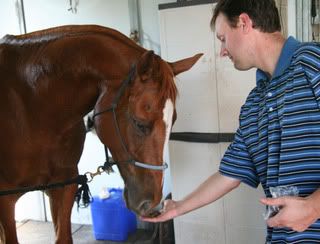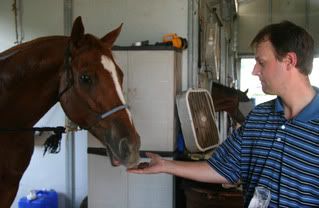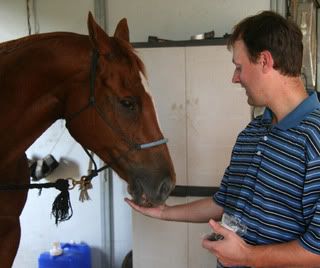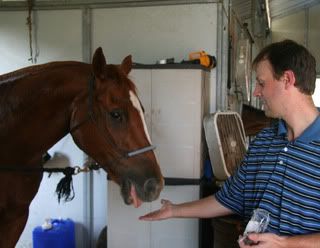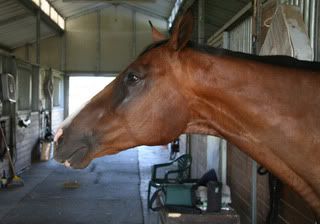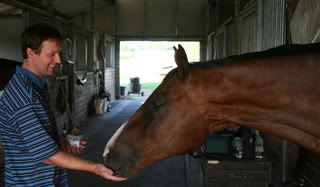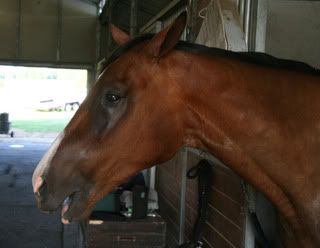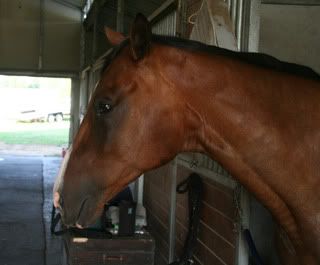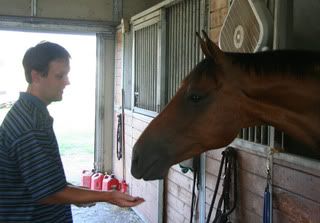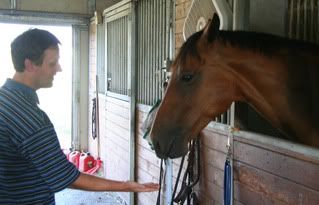Longeing a horse can be a very valuable tool for a variety of reasons. I personally find it extremely useful for building a horse's topline and carriage, as well as developing gaits without me sitting on top messing things up, as I am wont to do. It also gives you an eye on the horse that you don't have while mounted. So it is in this frame of reference that I am going to discuss my favourite longeing tool: vienna reins.
As a kid, I was taught to use side reins to longe (ALWAYS leather, ALWAYS the kind with donuts so they can give, thus were my commandments). When I got Solo, we had longeing battles of our own to fight before we could even think about doing anything actually technical on the line. But the time came when we were ready to learn about carrying yourself properly and in balance and so I duly purchased a pair of side reins.
And I discovered I didn't like them very much. True, they kept my horse from sticking his nose out too far. But they didn't prevent him from lifting his head straight up, they did not encourage him to go down and round, they somewhat discouraged him from taking contact with the bit (via the reins bouncing with each stride), and overall seemed to offer very little of actual use. Discouraged, I packed them away in the trailer where they remain to this day.
About a year and a half ago, a dressage friend lent me a set of vienna reins to try. In short, I loved them. They fulfilled every promise the side reins had broken years before: their soft sliding action encouraged my horse (who tended to be nervous and stiff while longeing, still fearing Scary Longeing Phantoms Of Lives Past) to reach down and softly mouth the bit and lift his back, they prevented him from throwing his head up in the air, and he could take contact without being jerked on. I saw a steady improvement in the quality of gaits, especially Solo's trot, and it helped build a correct topline which then improved under saddle work.
Therefore, today I share with you your very own step by step guide to using vienna reins should their application fit your goals for your horse. I must offer my thanks first to the S.O., who took most of the photographs on a VERY hot afternoon last week; the late day sun glare, floating dust, and non-functional autofocus on the lens all made for seriously tough shooting conditions.
Disclaimer: Solo is a vienna rein pro and has an excellent whoa on the longe line. If your horse has never worn them, please proceed slowly. The first time he pops his head up and hits the rein restriction, he may get nervous or panic, so make sure you start very loose and acclimate him in a safe, enclosed environment.
Step 1: Make sure your vienna reins are in good condition and the leather is well-conditioned and supple enough to slide easily through the bit rings. The reins themselves look like this:
Step 2: Apply gear to horse. I find it easiest to use a surcingle and the photos will show how to use the reins this way. You can also use them with a saddle and put the center loop over the girth between the front legs and run each side strap under either the girth near the buckles, or your billet straps for a higher setting.
For all longeing, I use a rope halter under a bridle (sans reins). I attach the longe line to the rope halter so (a) there is no bit pressure, Solo is on his own to figure out how to balance, etc., and (b) I don't have to do anything when we change directions.
I apply the surcingle first. I use a pad under it in the summer so I don't have to clean the sweat off as much. I then drape the reins around the base of the neck like so, with the ring centered on the chest and the reins crossed over the mane.
The center ring is then pulled between the front legs and buckled to the surcingle.
I leave the reins crossed over the neck and run them through low rings on the opposite side, so they are held out of the way for leading and warmup (never engage the reins until the horse has had a chance to stretch and warm up his muscles).
Step 3: Now I begin my warmup, which is some walk, allowing Solo to stretch down (his specialty) and get everything moving. Then we trot in each direction. I don't canter in warmup because my horse has issues. I keep him trotting until I get this trot, where he is stretching foward and down on his own, which tells me he is relaxed and warm.
Step 4: Engage vienna rein! I unbuckle the reins on both sides (but leave the girth loop buckled). I start on the off side (the horse's right) and I draw the right rein up and out through the bit ring. (Sorry again about the dust and sun. And I have to brag a little, check out how he now lets me lean the longe whip on him. Come a long way from shaking at the sight of one!)
Then I draw the rein back to the surcingle and through the ring of my choosing. We began with the ring lower than the one in the picture. Now that Solo has developed more, I use this higher one. The rein is twisted (bad me!) in the pic, make sure it lies straight so it can slide properly.
Then the rein is drawn back towards the bit and buckled back onto itself. It takes some experimentation to find the correct length for your horse and his way of going. Here is Solo with both reins hooked up at working length. Note that I keep the longe line coming out beneath the vienna rein so it doesn't interfere (yes, now you have a crazy spaghetti of lines on your horse's head).
Step 5: Move out! Usually, the horse will balk a little at the new restriction. You can see in the picture above, Solo isn't overtracking at the walk as he takes his first few steps feeling out the reins. I give him time to sort things out and stretch into it. Then we begin our trot work. It is common for him to start out not really tracking up at the trot either, as seen below, as he's still a bit stiff in the topline and hind end.
Step 6: Work that topline. If your horse is good at transitions on the line (Solo isn't, he sucks at downward transitions to walk), you can use them. I use a spiraling exercise. As Solo maintains a trot around me, I slowly gather the line until he is trotting on a 7-10 meter circle around me. You decide how small you want to make your circle by watching your horse; bring him in until you see him just starting to struggle a tiny bit, but no farther. It's supposed to be work, but not something he will fail at. You don't want him falling over himself.
Yes, initially I got myself all tangled up trying to hold all that line at once, but you work it out. You can see in the photo that most of the line is in my hands and I'm just holding the whip reminding Solo to keep up the energy. I only have him do one or two revolutions at the smallest circle (depends on strength) before I let him move back out to the full circle.
I am looking for two things during this exercise. (1) I want Solo to maintain his rhythm and outline and (2) I want him to engage his inside hind leg and reach under himself, crossing his midline to push and balance his body, like so.
We do this several times in both directions.
Step 7: Success!! Here, you can see that Solo is stepping under himself much better. His back is lifted and you can see that his entire front end has elevated. His front left foot is still off the ground even though the back right has landed.
This one shows you similar improvement at the trot. He's flexing his inside hock well and elevated his withers.
Step 8: A wee bit of canter work. This is still a work in progress, but the vienna reins are helping him to stay a little rounder and to use himself a little better. You can see in this photo that even though he is not as round and active through the back as he was at the trot, he will still reach his inside hind leg well up under his body for a nice, balanced, engaged stride.
Step 9: After a bit of canter, we get even more engagement in the trot work. Note increased impulsion, suspension, and reach in the stride and even more elevation of the withers and the base of the neck. Good boy!
Step 10: After this, we are pretty much done. Solo's given me some nice efforts, his brain has been working a mile a minute and it's hot. I stop him, unbuckle the reins, and cross them back over his neck for the all important stretch and cool out. This is what I like to see:
Lots of pats, lots of verbal praise, and I let him walk around for a few minutes while he stretches out his back and catches his breath. Then we return and disassemble.
So there you have it! This is our typical longe workout. Keep sessions short, I don't like to have a horse on the circle for more than 20 minutes or so. It's hard on joints and hard work for muscles so be fair in your requests. The exercises you choose to use on the line may vary depending on what you want to accomplish, but hopefully, now you have a place to start!
I hope you've made it through this lengthy treatise (now you know why it took me so long to post it)!! If you have any more questions, as always, throw them out there and I'll take a stab at them.
As a kid, I was taught to use side reins to longe (ALWAYS leather, ALWAYS the kind with donuts so they can give, thus were my commandments). When I got Solo, we had longeing battles of our own to fight before we could even think about doing anything actually technical on the line. But the time came when we were ready to learn about carrying yourself properly and in balance and so I duly purchased a pair of side reins.
And I discovered I didn't like them very much. True, they kept my horse from sticking his nose out too far. But they didn't prevent him from lifting his head straight up, they did not encourage him to go down and round, they somewhat discouraged him from taking contact with the bit (via the reins bouncing with each stride), and overall seemed to offer very little of actual use. Discouraged, I packed them away in the trailer where they remain to this day.
About a year and a half ago, a dressage friend lent me a set of vienna reins to try. In short, I loved them. They fulfilled every promise the side reins had broken years before: their soft sliding action encouraged my horse (who tended to be nervous and stiff while longeing, still fearing Scary Longeing Phantoms Of Lives Past) to reach down and softly mouth the bit and lift his back, they prevented him from throwing his head up in the air, and he could take contact without being jerked on. I saw a steady improvement in the quality of gaits, especially Solo's trot, and it helped build a correct topline which then improved under saddle work.
Therefore, today I share with you your very own step by step guide to using vienna reins should their application fit your goals for your horse. I must offer my thanks first to the S.O., who took most of the photographs on a VERY hot afternoon last week; the late day sun glare, floating dust, and non-functional autofocus on the lens all made for seriously tough shooting conditions.
Disclaimer: Solo is a vienna rein pro and has an excellent whoa on the longe line. If your horse has never worn them, please proceed slowly. The first time he pops his head up and hits the rein restriction, he may get nervous or panic, so make sure you start very loose and acclimate him in a safe, enclosed environment.
Step 1: Make sure your vienna reins are in good condition and the leather is well-conditioned and supple enough to slide easily through the bit rings. The reins themselves look like this:
Step 2: Apply gear to horse. I find it easiest to use a surcingle and the photos will show how to use the reins this way. You can also use them with a saddle and put the center loop over the girth between the front legs and run each side strap under either the girth near the buckles, or your billet straps for a higher setting.
For all longeing, I use a rope halter under a bridle (sans reins). I attach the longe line to the rope halter so (a) there is no bit pressure, Solo is on his own to figure out how to balance, etc., and (b) I don't have to do anything when we change directions.
I apply the surcingle first. I use a pad under it in the summer so I don't have to clean the sweat off as much. I then drape the reins around the base of the neck like so, with the ring centered on the chest and the reins crossed over the mane.
The center ring is then pulled between the front legs and buckled to the surcingle.
I leave the reins crossed over the neck and run them through low rings on the opposite side, so they are held out of the way for leading and warmup (never engage the reins until the horse has had a chance to stretch and warm up his muscles).
Step 3: Now I begin my warmup, which is some walk, allowing Solo to stretch down (his specialty) and get everything moving. Then we trot in each direction. I don't canter in warmup because my horse has issues. I keep him trotting until I get this trot, where he is stretching foward and down on his own, which tells me he is relaxed and warm.
Step 4: Engage vienna rein! I unbuckle the reins on both sides (but leave the girth loop buckled). I start on the off side (the horse's right) and I draw the right rein up and out through the bit ring. (Sorry again about the dust and sun. And I have to brag a little, check out how he now lets me lean the longe whip on him. Come a long way from shaking at the sight of one!)
Then I draw the rein back to the surcingle and through the ring of my choosing. We began with the ring lower than the one in the picture. Now that Solo has developed more, I use this higher one. The rein is twisted (bad me!) in the pic, make sure it lies straight so it can slide properly.
Then the rein is drawn back towards the bit and buckled back onto itself. It takes some experimentation to find the correct length for your horse and his way of going. Here is Solo with both reins hooked up at working length. Note that I keep the longe line coming out beneath the vienna rein so it doesn't interfere (yes, now you have a crazy spaghetti of lines on your horse's head).
Step 5: Move out! Usually, the horse will balk a little at the new restriction. You can see in the picture above, Solo isn't overtracking at the walk as he takes his first few steps feeling out the reins. I give him time to sort things out and stretch into it. Then we begin our trot work. It is common for him to start out not really tracking up at the trot either, as seen below, as he's still a bit stiff in the topline and hind end.
Step 6: Work that topline. If your horse is good at transitions on the line (Solo isn't, he sucks at downward transitions to walk), you can use them. I use a spiraling exercise. As Solo maintains a trot around me, I slowly gather the line until he is trotting on a 7-10 meter circle around me. You decide how small you want to make your circle by watching your horse; bring him in until you see him just starting to struggle a tiny bit, but no farther. It's supposed to be work, but not something he will fail at. You don't want him falling over himself.
Yes, initially I got myself all tangled up trying to hold all that line at once, but you work it out. You can see in the photo that most of the line is in my hands and I'm just holding the whip reminding Solo to keep up the energy. I only have him do one or two revolutions at the smallest circle (depends on strength) before I let him move back out to the full circle.
I am looking for two things during this exercise. (1) I want Solo to maintain his rhythm and outline and (2) I want him to engage his inside hind leg and reach under himself, crossing his midline to push and balance his body, like so.
We do this several times in both directions.
Step 7: Success!! Here, you can see that Solo is stepping under himself much better. His back is lifted and you can see that his entire front end has elevated. His front left foot is still off the ground even though the back right has landed.
This one shows you similar improvement at the trot. He's flexing his inside hock well and elevated his withers.
Step 8: A wee bit of canter work. This is still a work in progress, but the vienna reins are helping him to stay a little rounder and to use himself a little better. You can see in this photo that even though he is not as round and active through the back as he was at the trot, he will still reach his inside hind leg well up under his body for a nice, balanced, engaged stride.
Step 9: After a bit of canter, we get even more engagement in the trot work. Note increased impulsion, suspension, and reach in the stride and even more elevation of the withers and the base of the neck. Good boy!
Step 10: After this, we are pretty much done. Solo's given me some nice efforts, his brain has been working a mile a minute and it's hot. I stop him, unbuckle the reins, and cross them back over his neck for the all important stretch and cool out. This is what I like to see:
Lots of pats, lots of verbal praise, and I let him walk around for a few minutes while he stretches out his back and catches his breath. Then we return and disassemble.
So there you have it! This is our typical longe workout. Keep sessions short, I don't like to have a horse on the circle for more than 20 minutes or so. It's hard on joints and hard work for muscles so be fair in your requests. The exercises you choose to use on the line may vary depending on what you want to accomplish, but hopefully, now you have a place to start!
I hope you've made it through this lengthy treatise (now you know why it took me so long to post it)!! If you have any more questions, as always, throw them out there and I'll take a stab at them.





















